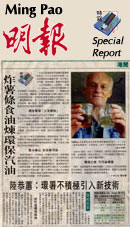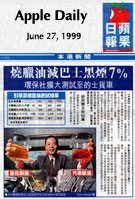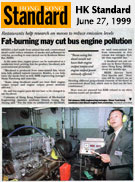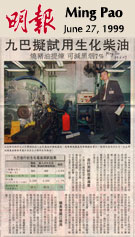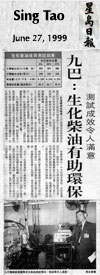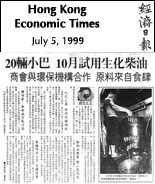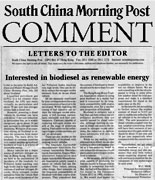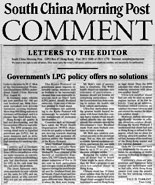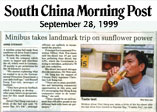![]()
Search the Journey to Forever website – click HERE
Biodiesel news articles published in Hong Kong
(Click on the image to read the full text.)
Contact usTo Keith Addison Handmade Projects |
 Biodiesel in
Biodiesel in
Hong Kong
One of our aims in making biodiesel was to propose a solution that could help improve Hong Kong's galloping air-pollution problem.
Hong Kong is choking on air-pollution. It drives people away, it drives business away, and it drives tourists away. It costs the city billions of dollars. The Government says it kills about 2,000 people a year. And it's getting worse all the time.
"Government studies confirm that the annual health costs associated with air pollution are equivalent to some half a percent of Hong Kong's GDP, that is, $5.5 billion at 1996 figures." -- Legislator Christine Loh, Citizens Party, RTHK, 2 May 1999
"A container truck driver died from carbon monoxide poisoning after being stuck in a traffic jam, a coroner concluded yesterday." -- South China Morning Post, April 1999
"Air pollution will worsen before it starts to improve, Environmental Protection Department director Robert Law warned yesterday." -- South China Morning Post, 25 March 1999
On "bad" days (not that there are "good" days) the government warns the old and the ill to stay indoors.
It's a complex issue, and there are constant furious debates about it. About the only thing everyone agrees on is that the main culprit is the exhaust smoke from diesel engines. But all plans to scrap the diesels have so far been scuttled by the transport lobby.
Hong Kong's transport industry, like transport industries everywhere, uses diesel engines, because they're cheap, tough, efficient, economical and reliable -- diesels last 10 times longer than petrol engines. Most people travel by diesel every day, virtually all goods are moved by diesels. Scrapping diesels would raise the costs of everything, making everyone's life tougher.
"'You can replace diesel taxis and minibuses but the remaining diesel problem has to do with vehicles that drive our economy,' an official said." -- Hong Kong Standard, 4 October 1999
There are about 135,000 of these "economic" diesels, accounting for nearly 70 per cent of the total road distance travelled in Hong Kong. Biodiesel could help provide an immediate solution.
"Why not just improve the existing diesel fuel and reduce its particulates?" -- Legislator Selina Chow, February 2 1996
"The Transport Department and the Environmental Protection Department should be working together to pilot new fuels and technologies that may be economically viable now or in a few years' time" -- Legislator Christine Loh, September 24 1998
So, when we brewed up some biodiesel out of waste cooking oil, the press got interested.
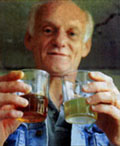 Keith Addison with Handmade biodiesel. |
Biodiesel in the news
"Environmentally clean fuel from used French fry oil," said the News Focus headline in Ming Pao Daily on 30 April 1999.
"Who would have thought that you could turn McDonald's French-fry used cooking oil into environment-friendly diesel fuel in your kitchen and run your car on it?" the paper asked, describing how we'd done it and why.
But it also reported that the Environmental Protection Department had said biodiesel "could increase emissions of Nitrogen Oxides" (NOx) and had therefore rejected it for Hong Kong.
We said they were wrong, and quoted published research that showed NOx levels could be reduced below ordinary diesel levels simply by adjusting the engine timing.
And environmentalist legislator Christine Loh, who has strong views on air-pollution, attacked the EPD, calling them "shortsighted" and "unfair".
Not wanting to get involved in a political row, we backed off, and in some confusion.
"The EPD recently toughened emissions controls to bring Hong Kong into line with European and US standards." -- South China Morning Post, 29 January 1999
"Like most European countries, we will be adopting the more stringent Euro III emission standard as from 2001." -- 1999 Policy Address, Tung Chee-hwa, Chief Executive of the Hong Kong Special Administrative Region (SAR), 6 October 1999
But both Europe and the US use millions of gallons of biodiesel every year. Both are expanding their diesel fleets in a bid to cut greenhouse gas emissions, in line with the Kyoto Protocol.
"So important is biodiesel as a low-cost, immediate solution to diesel emission problems that the US Congress has passed biodiesel legislation to foster public acceptance and industry use of this new alternative vehicle fuel." -- US biodiesel producer Southern States Power, news release, 30 March 1999
Yet Hong Kong bans it, on the grounds of NOx emissions, though dozens of scientific studies by major instititions show that NOx emissions with biodiesel are easily reduced to well below conventional diesel levels, without sacrificing the considerable reductions in particulate matter (PM) emissions with biodiesel, which are a far worse pollutant anyway.
"We've done all the things on vehicle pollution and control of dust emissions that they've done in Europe. We have the toughest standards in Asia. But while Europe has seen dramatic improvements, we haven't." -- Tse Chin-wan, Assistant Director, EPD, Postmagazine, 24 January 1999
Maybe we're not alone in our confusion.
Progress?
A couple of weeks later the Ming Pao reporter called us to say the EPD spokesman had told him they'd decided to reverse their decision to reject biodiesel as a way to fight air-pollution, because we'd shown that it could be made by recycling a waste product (used cooking oil), giving it a dual purpose.
The EPD still had reservations about the level of nitrogen oxide emissions with biodiesel, the spokesman said, but the department now had an open mind on biodiesel and would make further investigations.
Christine Loh later confirmed to us that the EPD had changed their stance. "They just needed to get prodded on the NOx bit," she said.
Good enough. We knew other people were working on making biodiesel available in Hong Kong, we'd brought the issue to the public eye and helped open the door, so we left them to it and got on with other work.
Good news -- and bad
"KMB tests biodiesel -- made from BBQ pork fat, it can decrease black smoke by 7%," read a Ming Pao headline on 27 June. Most of the big papers carried the story. This might fit in nicely with the EPD's singular view of biodiesel, but it's wrong, and ruling out used vegetable oil as a source material is not helpful. The whole promising biodiesel initiative in Hong Kong was being derailed, for no good reason we could see. We received several emails from parties interested in biodiesel, furious at Mr Mok's response: But Mr. Mok was unfazed. On 28 September the South China Morning Post carried a front-page story of another biodiesel test, featuring a minibus in a 10-kilometre on-road test of sunflower oil biodiesel from Germany, conducted by Sunland. In his 1999 Policy Address in October, Tung Chee-hwa, Hong Kong's Chief Executive, outlined his plan to clean up Hong Kong's filthy air. "WHILE Hong Kong fiddles, biodiesel will burn in the vehicle of two intrepid explorers from Lantau Island on their way overland to South Africa. Keith Addison and Midori Hiraga will brew the stuff as they travel on a 2-year expedition through China and Africa studying and reporting on environmental conditions. By the time they get there, perhaps Hong Kong will have made up its mind on biodiesel." The article said: "Switching vehicles from diesel to liquefied petroleum gas might pose health risks, research carried out at America's Harvard University suggests." With the support of the US National Biodiesel Board, the Taiwan chapter of the American Soybean Association (ASA) has completed the dossiers for registration of soy-based biodiesel on the clean fuel list. Road tests will start in September. A local bus fleet that will provide six buses for the road tests. Each bus will run on its regular route for two and a half months to generate data. If soy-based biodiesel is approved, ASA will work with the government of Taiwan to develop mandates and incentive programs to encourage the use of soy-based biodiesel.
In cooperation with a group called Better Environment Hong Kong (BEHK), KMB (Kowloon Motor Bus), Hong Kong's biggest franchised bus company, much criticized for belching black smoke, had tested weak blends of 10 to 15% biodiesel with ordinary diesel fuel in a bench-mounted Cummins LT10 diesel engine from one of its buses, and called the press to witness it.

KMB engineering manager Shum Yuet-hung at the biodiesel press conference.
Good news! But what was all this stuff they were saying about nitrogen oxide emissions?
BEHK member Dr Dennis Leung Yiu-cheong, an associate professor at the University of Hong Kong Department of Mechanical Engineering, said: "For the tests we conducted on biodiesel, we used waste animal fats from restaurants as they release less nitrogen dioxide than vegetable fats" (Hong Kong Standard).
He also said animal-fat biodiesel decreases pollutant particles compared with biodiesel made from vegetable oil (Sing Tao), and that "in Europe and the US, where the temperature is moderate, mostly vegetable oil is used for biodiesel. He said because Hong Kong's weather is warmer, animal fat, which doen't contain sulphur, does not solidify, so it can be used to make more environmentally friendly biodiesel" (Apple Daily).
So now we have "environmentally friendly biodiesel" from animal fats and, what, environmentally unfriendly biodiesel from vegetable oil, depending on the weather? Who are these guys? (They're a group of local academics and others, apparently supported by Mobil Oil.)
And Ming Pao reported: "The EPD has reserved judgment because biodiesel could increase Nitrogen Oxides in the exhaust compared with ordinary diesel."
Whatever happened to their change of mind?
The Hong Kong Economic Times did a follow-up story the following week: "An EPD spokesman said: 'Using biodiesel as a fuel for vehicles could increase Nitrogen Oxide (NOx) emissions in exhaust gas. NOx is already high in Hong Kong's Air Pollution Index, so using biodiesel will not improve Hong Kong's air pollution problem.'"
The story also reported BEHK chairman Steve Choi Sau-yim saying: "The key is in the materials used. If animal fats are used to make biodiesel, it can cut NOx in the exhaust to about 5 to 10% less than petro diesel, while plant oil biodiesel increases it by 15%. If you choose the material (the origin of the cooking oil) carefully, it's not difficult to solve the NOx problem."
Non-issues
Some studies have indeed shown lower NOx emissions with animal-fat biodiesel than with virgin vegetable oils, because fats have different combustion characteristics.
But recycled oils and palm oils have similar profiles to fats -- there's no difference between NOx emissions from animal-fat biodiesel and biodiesel made from used vegetable cooking oils or from palm oil.
Anyway, whatever it's made of, NOx emissions with biodiesel are a non-issue: "Biodiesel NOx emissions can be effectively managed and efficiently eliminated as a concern of the fuel's use," says the US National Biodiesel Board, along with everybody else except Hong Kong's EPD. Action
So we wrote a letter to the Editor of the South China Morning Post. It was published as the main letter on 20 July ("Don't allow biodiesel opportunity to slip away"), and it sparked a chain of responses, first in support, and then another main letter, a schoolmarmish rebuttal by W.C. Mok of the EPD ("Interested in biodiesel as renewable energy"), baffling in its opacity and denial, totally rejecting biodiesel in favour of the EPD's plans to convert Hong Kong's 18,000 diesel taxis to Liquid Petroleum Gas (LPG).
There are serious objections to the LPG plan and severe obstacles to its being implemented, and even if it is implemented the effect is expected to be minimal:"Perhaps you think that the API (Air Pollution Index) readings are going to zoom dramatically downwards if LPG is introduced. They will not," said the South China Morning Post (24 January 1999). "That could turn out to be a major public relations disaster."
Reaction
"It is very disappointing to read today in the South China Morning Post the answer to your article from Mr. Mok..."
"Mr. Mok should know that there are dozens if not hundreds of cities that use biodiesel just for the air quality in their city..."
"There is 20 years' experience of biodiesel..."
We posted Mr. Mok's letter on the Internet bulletin board run by the US National Biodiesel Board, without comment. This drew some interesting responses:
"I read this letter and can't help feeling that Mok is the public relations/damage control for the oil companies..." (Message)
"I am surprised to find someone like Mr. Mok who still can maintain his biased position for LPG. Not too many people talk about LPG as an alternative green fuel any more..."
"President Clinton just passed an 'Executive Order' on August 12 to 'promote Biodiesel use to meet environmental challenges'. This is news for Mr. Mok..."
Two weeks later the South China Morning Post published yet another main letter on biodiesel, from engineer and entrepreneur Paul Tarrant, who demolished Mr Mok's arguments with great authority ("Government's LPG policy offers no solutions" ).
Good enough to drink

...and he drank it!
It took Sunland 18 months and "many letters" to get permission for the test. Such caution -- when more than 60% of the diesel fuel used in Hong Kong is smuggled in from China and sold at half-price or less, poor-quality, dirty stuff containing 10 times as much sulphur as legal diesel fuel.
The story quoted Mr. Mok denigrating biodiesel in favour of LPG: "Bio-diesel increased nitrogen dioxide emissions, Mr Mok said."
This didn't bother the minibus driver. The original Ming Pao story on biodiesel showed Keith holding up two glasses of biodiesel; Apple Daily followed suit, showing KMB's engineering manager holding up two glasses of biodiesel. Now driver Choi Hang-wan also had a glass of biodiesel -- and he drank it!
"It tastes fine," he said.The road ahead
It included LPG for taxis and minibuses, particulate traps, catalytic converters, $1.4 billion in grants for the conversions, phase-outs of old diesels, tougher standards, tougher action against smoky vehicles, tougher action on smuggled diesel fuel, pedestrianization schemes, electric vehicles, more use of rail services.
It didn't include anything that could bring an immediate improvement, such as biodiesel.
-- Lisa Hopkinson, October 31, 1999, Clear the Air (Hong Kong)
http://www3.cleartheair.org.hk/biodiesel.htm
LPG health risks
"LPG 'could be worse for health than diesel'." -- South China Morning Post, 23 August, 2000.
The study, by the Harvard Center for Risk Analysis (HCRA) at Harvard School of Public Health, found, among other things, that natural gas (LPG) reduces emissions of fine particulates, those smaller than 2.5 microns, but may generate more ultrafine particles than diesel, of less than 0.1 micron.
"Several studies indicate that ultrafine particles may have an even more dramatic impact on health than those in the fine category."
It also found that LPG would increase greenhouse gas emissions, of C02, and of methane, which "is approximately 20 times more potent as a greenhouse gas than CO2".
"European regulators seem to be favoring diesel fuel as part of their effort to comply with the Kyoto agreements to stabilize CO2 and other greenhouse gas emissions," the report said. "They are using tax incentives and emissions standards to encourage the use of new cleaner-burning diesel fuels. European vehicle manufacturers appear to be increasing their application of 'green' diesel technology that captures significant amounts of particulates."
Harvard press release:
http://www.hsph.harvard.edu/press/releases/press1102000.html
Complete copy of the report (PDF, 205 KB):
http://www.hsph.harvard.edu/Organizations/hcra/diesel/diesel.pdfBiodiesel in Taiwan
Biofuels
En español -- Biocombustibles, biodiesel
Biofuels Library
Biofuels supplies and suppliers
Biodiesel
Make your own biodiesel
Mike Pelly's recipe
Two-stage biodiesel process
FOOLPROOF biodiesel process
Biodiesel processors
Biodiesel in Hong Kong
Nitrogen Oxide emissions
Glycerine
Biodiesel resources on the Web
Do diesels have a future?
Vegetable oil yields and characteristics
Washing
Biodiesel and your vehicle
Food or fuel?
Straight vegetable oil as diesel fuel
Ethanol
Ethanol resources on the Web
Is ethanol energy-efficient?
